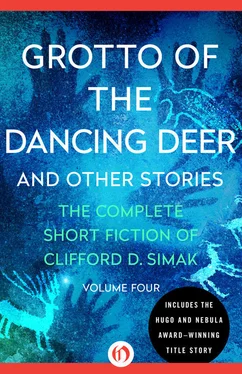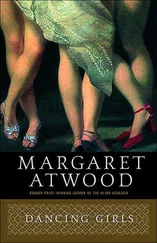He climbed the stairs and went outside to prowl restlessly about the yard, still upset by that nagging something about the bomb he could not yet pin down.
The moon had risen. The yard was a place of interlaced light and shadow, but beyond the fence the desert acres that held the other houses lay flat and bare and plain, without a shadow on them except the shadows of the houses.
Two of the dogs came up and passed the time of night with him and then went off into the shrubbery.
He moved into the backyard and stood beside the sun dial.
The wrongness still was there. Something about the sun dial and the bomb—some piece of thinking that didn’t run quite true.
He wondered how they knew that the destruction of the sun dial would be a heavy blow to the owner of the stronghold. How could they possibly have known?
The answer seemed to be that they couldn’t. They didn’t. There was no way for them to know. And even if, in some manner, they had learned, a sun dial most certainly would be a piddling thing to blow up when that single bomb could be used so much better somewhere else.
Stony Stafford, the leader of the Punks, was nobody’s fool. He was a weasel—full of cunning, full of savvy. He’d not mess with any sun dial when there was so much else that a bomb could do so much more effectively.
And as he stood there beside the sun dial, Max knew where that bomb would go—knew where he would plant it were he in Stafford’s place.
At the roots of that ancient oak which leaned toward the fence.
He stood and thought about it and knew that he was right.
Billy Warner, he wondered. Had Billy double-crossed him?
Very possibly he hadn’t. Perhaps Stony Stafford might have suspected long ago that his gang harbored an informer and, for that reason, had given out the story of the sun dial rather than the oak tree. And that, of course, only to a select inner circle which would be personally involved with the placing of the bomb.
In such a case, he thought, Billy Warner had not done too badly.
Max turned around and went back to the house, walking heavily. He climbed the stairs to his attic room and went to bed. It had been, he thought just before he went to sleep, a fairly decent day.
III
The police showed up at eight o’clock. The carpenters came and put up the dance platform. The musicians appeared and began their tuning up. The caterers arrived and set up the tables, loading them with food and two huge punch bowls, standing by to serve.
Shortly after nine o’clock the Punks and their girls began to straggle in. The police frisked them at the gates and found no blackjacks, no brass knuckles, no bicycle chains on any one of them.
The band struck up. The Punks and their girls began to dance. They strolled through the yard and admired the flowers, without picking any of them. They sat on the grass and talked and laughed among themselves. They gathered at the overflowing boards and ate. They laughed and whooped and frolicked and everything was fine.
“You see?” Pollard said to Max. “There ain’t nothing wrong with them. Give them a decent break and they’re just a bunch of ordinary kids. A little hell in them, of course, but nothing really bad. It’s your flaunting of this place in their very faces that makes them the way they are.”
“Yeah,” said Max.
He left Pollard and drifted down the yard, keeping as inconspicuous as he could. He wanted to watch the oak, but he knew he didn’t dare to. He knew he had to keep away from it, should not even glance toward it. If he should scare them off, then God only knew where they would plant the bomb. He thought of being forced to hunt wildly for it after they were gone and shuddered at the thought.
There was no one near the bench at the back of the yard, near the flowering almond tree, and he stretched out on it. It wasn’t particularly comfortable, but the day was warm and the air was drowsy. He dropped off to sleep.
When he woke he saw that a man was standing on the gravel path just beyond the bench.
He blinked hard and rubbed his eyes.
“Hello, Max,” said Stony Stafford.
“You should be up there dancing, Stony.”
“I was waiting for you to wake up,” said Stony. “You are a heavy sleeper. I could of broke your neck.”
Max sat up. He rubbed a hand across his face.
“Not on Truce Day, Stony. We all are friends on Truce Day.”
Stony spat upon the gravel path.
“Some other day,” he said.
“Look,” said Max, “why don’t you just run off and forget about it? You’ll break your back if you try to crack this place. Pick up your marbles, Stony, and go find someone else who’s not so rough to play with.”
“Some day we’ll make it,” Stony said. “This place can’t stand forever.”
“You haven’t got a chance,” said Max.
“Maybe so,” said Stony. “But I think we will. And before we do, there is just one thing I want you to know. You think nothing will happen to you even if we do. You think that all we’ll do is just rip up the place, not harming anyone. But you’re wrong, Max. We’ll do it the way it is supposed to be with the Crawfords and with Nora. We won’t hurt them none. But we’ll get you, Max. Just because we can’t carry knives or guns doesn’t mean there aren’t other ways. There’ll be a stone fall on you or a timber hit you. Or maybe you’ll stumble and fall into the fire. There are a lot of ways to do it and we plan to get you plenty.”
“So,” said Max, “you hate me. It makes me feel real bad.”
“Two of my boys are dead,” said Stony. “There are others who are crippled pretty bad.”
“There wouldn’t be nothing happen to them, Stony, if you didn’t send them up against the fence.”
He looked up and saw that hatred that lay in Stony Stafford’s eyes, but washing across the hatred was a gleam of triumph.
“Good-by, dead man,” said Stony.
He turned and stalked away.
Max sat quietly on the bench, remembering that gleam of triumph in Stony Stafford’s eyes. And that meant he had been right. Stony had something up his sleeve and it could be nothing else but the bomb beneath the oak.
The day wore on. In the afternoon, Max went up to the house and into the kitchen. Nora fixed him a sandwich, grumbling.
“Why don’t you go out and eat off the tables?” she demanded. “There is plenty there.”
“Just as soon keep out of their way,” said Max. “I have to fight them all the rest of the year. I don’t see why I should pal up with them today.”
“What about the bomb?”
“Shhh,” said Max. “I know where it is.”
Nora stood looking out the window. “They don’t look like bad kids,” she said. “Why can’t we make a peace of some sort with them?”
Max grunted. “It’s gone too far,” he said.
Pollard had been right, he thought. It was out of hand. Neither side could back down now.
The police could have put a stop to it to start with, many years ago, if they had cracked down on the vandals instead of adopting a kids-will-be-kids attitude and shrugging it all off as just an aggravated case of quarreling in the neighborhood. The parents could have stopped it by paying some attention to the kids, by giving them something that would have stopped their running wild. The community could have put a stop to it by providing some sort of recreational facilities.
But no one had put a stop to it. No one had even tried.
And now it had grown to be a way of life and it must be fought out to the bitter end.
Max had no illusions as to who would be the winner.
Six o’clock came and the Punks started drifting off. By six thirty the last of them had gone. The musicians packed up their instruments and left. The caterers put away their dishes and scooped up the leftovers and the garbage and drove away. The carpenters came and got their lumber. Max went down to the gates and checked to see that they were locked.
Читать дальше












